“I consider myself as good as dead, at least until we safely pass Chin Shwe Haw town,” recounted Mai Aik Tha (pseudonym), sharing his harrowing escape experience during his journey home.
Mai Aik Tha had been working as a cleaner in one of the hotels in Laukkai town, in Kokang area, Northern Shan State.
After being stuck in Laukkai town for approximately two weeks due to “Operation 1027,” Mai Aik Tha, along with his friends, made the daring decision to venture out of the town towards his home in Kyaukme, Northern Shan State.
Due to the intense and ongoing fighting, the usual Laukkai-Chin Shwe Haw-Hsenwi road was impassable. They decided on an alternative route through the “Wa” region, traveling from Namtip to Pangsag, then onward to Tangyan, Hsipaw, and finally reaching Kyaukme.
In the days leading up to their departure from Laukkai town, they gathered information about the road conditions. Learning that some had successfully returned home, they felt more confident about their decision to undertake the journey.
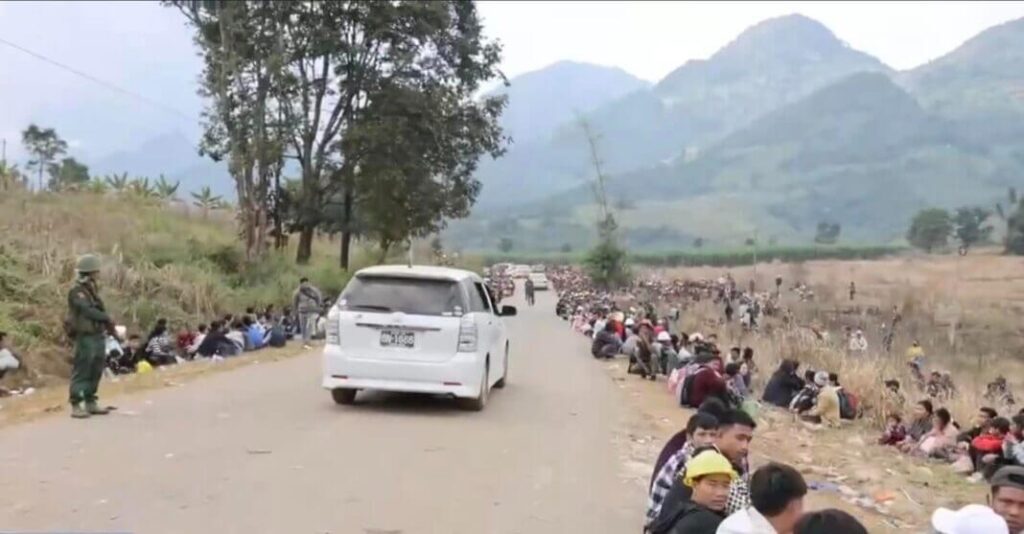
To ensure they were well-prepared for the challenges ahead, they prepared bedding for the trip and stocked up on enough food to last them about a week.
Having made their preparations, on the early morning of November 9th, Mai Aik Tha and his group of friends, a total of 12 individuals on six motorcycles, departed Laukkai town. The group comprised both Ta’ang and Shan individuals.
While some people opted to hire cars or other vehicles for their homeward journey, incurring costs ranging from 2000 Chinese Yuan (approximately 900,000 MMK) to 3000 Yuan (about 1,300,000 MMK).
After an hour of riding, they reached a checkpoint established by the MNDAA, situated after Pasinkyaw village, between Laukkai and Chin Shwe Haw. Mai Aik Tha and his friends experienced something at this checkpoint that they had never experienced before in their life.
“They escorted us, instructing us to leave our bikes, motorbike keys, and all belongings behind right at the check-point. Upon reaching their inspected area, they looked over everything we had. Our mobile phones and possessions were confiscated, accompanied by a threat that if we refused to surrender our phones and they discovered them later, they would resort to shooting us,” explained Mai Aik Tha.
People must leave everything of their possessions—including food—as well as their vehicles—including cars, motorcycles, and cell phones—at the checkpoint.
On November 10, a report from the local news agency Shwe Phee Myay highlighted that the MNDAA confiscated the mobile phones of more than 20 civilians who were returning from Laukkai and originally from Lone Kan village in Manton township. This action has created challenges for the local villagers in their journey back home.
In response to the incident of phone confiscation, Li Kyar Win, the spokesperson for the MNDAA, explained that the measure was taken for security reasons.
Mai Aik Tha also disclosed that individuals from ethnic backgrounds like Taang, Shan and Burmese, experienced differential treatment and faced threats of gunfire.
“If Chinese individuals communicated with them (MNDAA members) in Chinese, they were permitted to retrieve their belongings like motorbikes and cars. However, when individuals from ethnic backgrounds like ours approached them (to retrieve the belongings), they were met with gun threats. Initially, the guns were pointed towards the sky, but later, threats escalated with random firing. This resulted in people being injured by bullets. One person narrowly escaped injury as the bullet grazed the surface of his head, while another sustained injuries to his calf and foot,” Mine Aik Tha recounted.
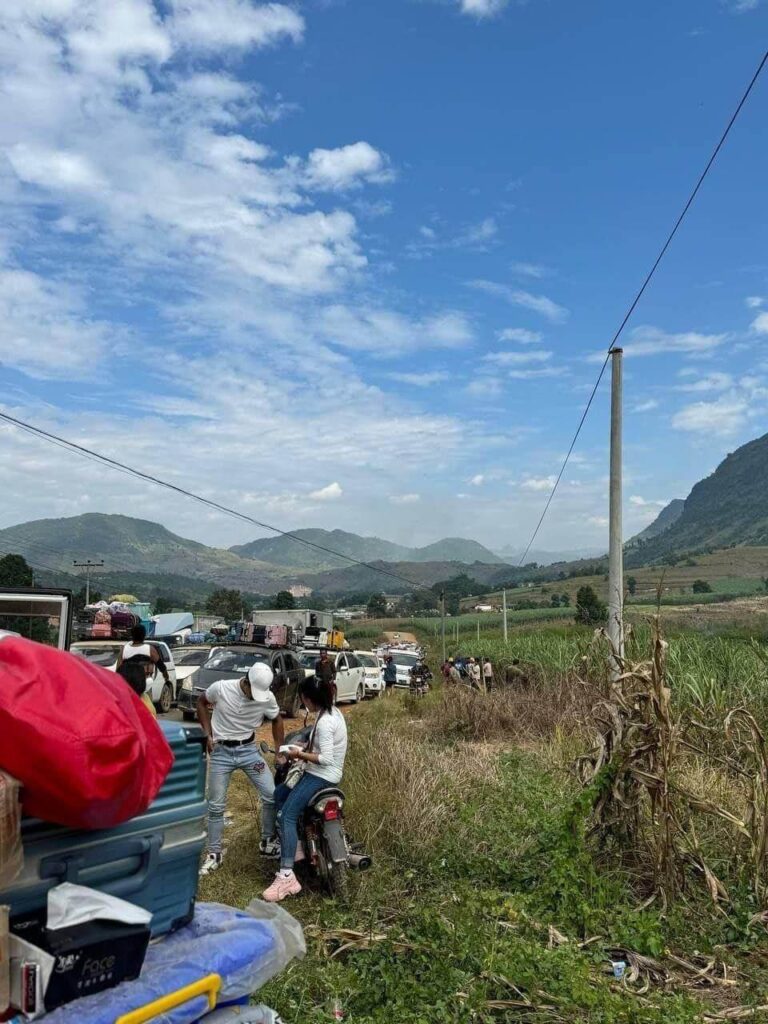
On that particular day, due to the random firing of guns by MNDAA members, those gathered in a crowd (those returning home) were thrown into chaos, mistakenly believing that a fighting was taking place, Mai Aik Tha recounted.
To regain control of the situation, MNDAA members fired shots into the air, attempting to guide the scattered crowd back together.
“We were not only prohibited from eating, but we were also denied access to our belongings. Despite having prepared enough food to sustain us for a week, they forbade us from even drinking water. We were neither allowed to take our water nor provided with any,” stated Mai Aik Tha, who eventually managed to make it back home.
He described a dire situation where people were left starving and exhausted, forced to wait for many hours for an entire day by the roadside. Only in the evening did the MNDAA bring in a 22-wheel truck to transport those on their way back home to the IDP camp in Namtip town in the “Wa” region.
Sai Aung also added that, starting from Namtip where they stayed overnight, they journeyed home via Tangyan-Hsipaw and finally reached Kyaukme. In total, it took them about five days from Laukkai town to Kyaukme. They finally arrived home on the night of November 13.
“We embarked on our journey from Lauk Kai, traversing through Pa Sin Kyaw, Chin Shwe Haw, and finally arriving at Nam Tip. As displaced persons, we had to spend the night in Namtip. Only six of us remained by the end of that day. Unable to afford a taxi or car to get back home, we pooled our resources and bought two old motorbikes. Three individuals shared each motorcycle, and we continued our journey. We just reached home yesterday (14 Nov),” shared Sai Aung.
Sai Aung emphasized that there are still returnees stranded along the Laukkai and Chin Shwe Haw road, and there are also people missing.
On November 11th, around noon, a tragic incident unfolded when an artillery shell landed near the Se Ton gate. Three local residents were killed while six others sustained injuries.
According to information released by the State Administration Council (SAC) on November 13, ongoing clashes persist along the road between the SAC military council and the three Northern Brotherhood Alliance.
Due to the ongoing fighting and tension, those who have been trapped in the Laukkai town are facing shortage of food.
With the commencement of the “1027 Operation” the price of a bag of rice surged to 1,000 Chinese yuan (approximately 400,000 Myanmar kyats). The road blockades not only led to a scarcity of rice for sale but also caused the depletion of other essential foods, such as Ma Ma instant noodles, in Laukkai town.
“Thousands of people are still trapped at Se-ton Gate and Pasinkyaw. Among those stuck are breastfeeding mothers with infants, elderly individuals, and those awaiting treatment at hospitals. The intensified armed conflict adds an additional layer of danger to the situation,” stated a person who is among those trapped.
The individuals who found themselves trapped in the war-torn city of Lauk Kai in Northern Shan risked their lives to escape the ongoing conflict.
“Now that I’m back home, we can still hear the sounds of fighting and the explosions of small and large weapons around our town. However, being with my family makes me feel better, and it’s preferable to being trapped on the road,” shared Sai Aung, expressing his current feeling.





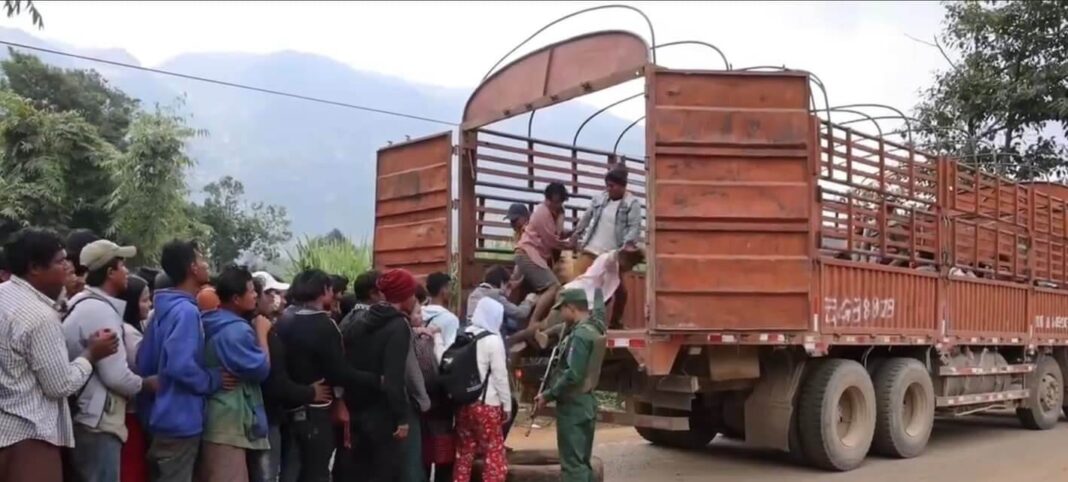
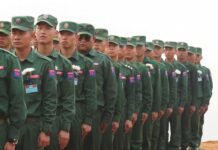
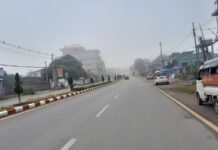

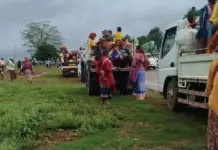
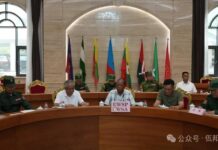






Leave a Comments